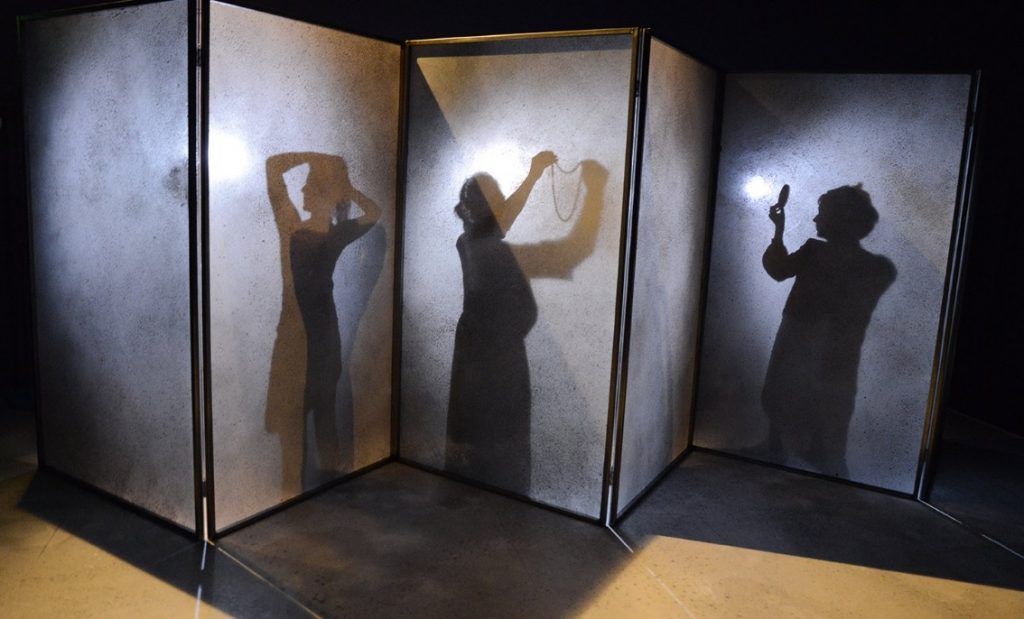Silence, a new play by Nicky Werenowska which explores the effects of WW2 on three generations of a family with Polish heritage, will be staged at the University of Reading on 8 November. Here, Dr Teresa Murjas, who curates the artists collective behind the play, tells us about their collaboration and how it is shaping her practice-led research.

A few years ago, I started work on a practice-led research project entitled Surviving Objects.
I wanted to use the project to discover how, as an arts practitioner, I might convey to a contemporary audience my family’s experience of deportation by the NKVD (the interior ministry of the Soviet Union) from Poland to Siberia during WW2. My family subsequently spent six years in a British-run refugee camp in Bwana M’Kubwa, Zambia and eventually arrived at a displaced persons camp in the English countryside after the end of the conflict.
Immersive theatre
Surviving Objects began life as a large-scale multi-media performance with two actors and split-screen video projection. It has gradually evolved into a small-scale, site-specific installation, during which an audience sit in a mock-up of my mother’s living room holding ipads, and wearing headphones.
Making Surviving Objects pushed me to make a series of key decisions, including how to work consensually with my mother to tell aspects of her experience (and consequently my own) by sharing her personal testimony and archival materials with an audience.
Nuclear bunker
The four different iterations of this project so far have combined live performance, objects and video in different ways to explore an inter-generational legacy of forced displacement. Most recently it was shown at Kelvedon Hatch Secret Nuclear Bunker as part of Essex Book Festival’s Nuclear Option event, alongside many other arts practitioners and writers, including that of the Peeling onions with granny artists collective.

Peeling onions with who?
Our collective takes its name from a film made by one of its members, Chris Dobrowolski, about his deceased Latvian grandmother, whom he never met. When we talked about a name for our group, we decided this was the one that suited us best collectively – because of associations with memory, recovery, bitterness, comfort, nourishment and pleasure. The name conjures images which are both comforting and unsettling at the same time, which is appropriate given the difficult legacies that our work addresses.
Peeling onions with granny is based in the Department of Film, Theatre & Television, and comprises myself and Coventry University’s Adrian Palka. Both of us are of Polish heritage and engage in practice-led research, much of which responds to themes of migration and forced displacement.
Our colleagues are Chris, an artist and performer and Nicky Werenowska, a playwright, both of whom are based in Colchester; Simon Purins, a filmmaker working in London; and artist and independent heritage interpreter Elina Kalnina, who is based in Cesis, Latvia.
We came together when I was creating Surviving Objects because, as it turned out, all of us happened to be making work about the inter-generational effects of the mass Soviet deportations of Polish and Latvian citizens during the same historical period and in addition all of us have close family connections to these events.
Three generations
Nicky’s play Silence draws on the experience of her husband’s family, which has at its centre a deportation narrative, and the play highlights the relationships between three generations of women.
It is a professional touring production which started at the Mercury Theatre in Colchester and will be performed in Minghella Studios next week.
A review in The Stage review highlighted the energy and commitment of the performance, the ‘desolate’ but evocative set, and ‘crisply interlocking monologues’. I would like to very warmly invite everyone to next week’s performance.
Event details: The performance starts at 7.30pm and runs for 2 hours. Tickets are priced at £12 and can be reserved by emailing minghellastudios@reading.ac.uk. Tickets can be picked up and bought (cash only) on the door. Minghella Studios is building marked 195 on this map. The nearest car parks are 2, 3 and 4.
Read an interview with Nicky about Silence on the Mercury Theatre’s blog.
Silence is a Mercury Theatre Colchester, Wiltshire Creative and Unity Theatre Liverpool Production.
More about Peeling onions with granny’s projects:
Adrian Palka has created a mixed media installation Bark and Butterflies draws on his father’s personal archive from Siberia, and on a recently retraced wartime journey, also incorporating testimony.
Chris Dobrowolski’s one-man performance All Roads Lead to Rome focuses on his father’s deportation and wartime experience, narrating his retracing of his father’s wartime journey in the family’s old Triumph Herald, which Chris ‘brought back to life’ for this purpose (at least for a time, until the vehicle was stolen and torched!).
Elina Kalnina’s extraordinary testimony-based website Be Yourself! combines video with strategic animation and prioritises the recovery and vocal performance of hidden deportation narratives and their retelling to a younger generation. The site has been translated into a number of languages including Russian and English.
Simon Purin’s video installation Peeling onions with granny dramatises an imagined conversation between his deceased Latvian grandmother, whom he never met, and his own daughter, who like him was born in the UK.
For more information, visit: www.peelingonionswithgranny.org
